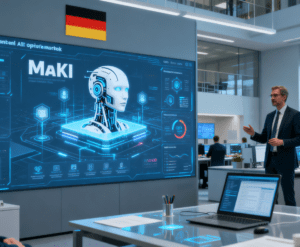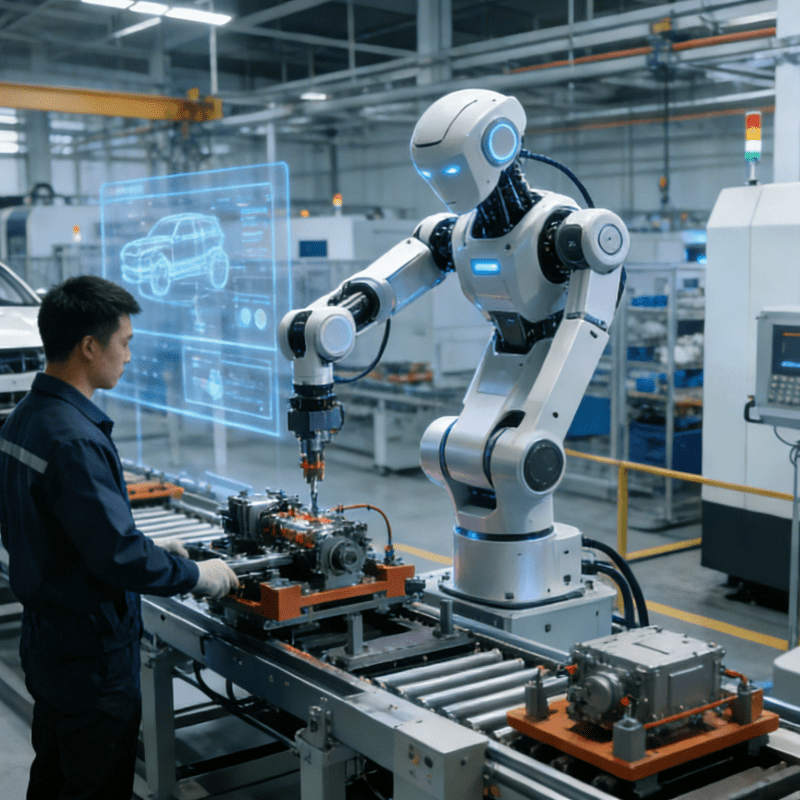
Launch of MaKI: Proactively Meeting EU AI Act Compliance Requirements and Resolving the “Information Silo” Dilemma in Administrative AI
Against the backdrop of accelerated globalization and standardization of AI governance, how to enhance administrative efficiency while safeguarding public trust has become a core issue in the digital transformation of countries worldwide. In September 2025, Germany’s Federal Ministry of the Interior, in collaboration with various federal ministries, officially launched the Künstliche Intelligenz Marktplatz (MaKI, AI Opportunity Market). Through this platform, a panoramic and transparent display of AI applications across federal administrative departments was realized for the first time. This initiative not only responds to the transparency requirements of the EU’s Artificial Intelligence Act (which takes effect in 2026) but also marks a crucial step for Germany in advancing from technological application to institutional innovation in the digital transformation of public governance.
AI presents significant opportunities for federal administrative departments to optimize processes and improve service quality, with its core centered on a “people-oriented” approach—making public services more efficient and better aligned with the needs of the people. Nancy Faeser, Germany’s Federal Minister of the Interior, emphasized: “Advancements in AI are reshaping public administrative models. It holds enormous potential, but also comes with challenges. We are leveraging AI to enhance government effectiveness and provide more convenient services to the public, and the openness and transparency of technology are key to winning trust—that is precisely the original intention behind our launch of the AI Opportunity Market.”
Three Core Functions as the Foundation: Panoramic Asset Inventory, Cross-Departmental Collaboration, and Compliance Supervision Unlock the Reuse Value of Administrative AI
As an infrastructure for federal AI governance, MaKI fulfills three core functions:
Panoramic AI Asset Inventory: Systematically organizing existing and planned AI systems at the federal level for the first time to form a dynamically updated resource map;
Cross-Departmental Collaboration Network: Breaking down barriers between AI application scenarios of various ministries and federal agencies to promote the reuse of mature solutions and sharing of technical experience, significantly reducing costs associated with redundant construction;
Data Visualization Supervision: Real-time display of key data such as AI application coverage and performance indicators through an interactive dashboard, providing accurate references for decision-making.
Currently, the platform has incorporated demonstration projects in multiple fields, including intelligent approval and risk early warning, offering replicable practical models for federal administrative departments. Notably, through a standardized data entry and release mechanism, MaKI has established a transparency database that complies with the requirements of the EU’s Artificial Intelligence Act (Articles 50 and 53), ensuring that public sector AI systems disclose basic information and summaries of training data. This forward-looking arrangement not only mitigates compliance risks but also positions Germany favorably in the European AI governance framework.

Three-Level Evolution from Federal to Local: Building an AI Collaboration Network to Reshape the Trust Bond in Public Governance
According to plans, MaKI’s evolution will proceed in phases: Starting from the first quarter of 2025, AI systems of state and local governments will be piloted for integration, gradually forming a three-level AI collaboration network covering the federal, state, and local administrative systems. As the first implemented project of the Artificial Intelligence Advisory Center (BeKI), its operational experience will also provide practical basis for the subsequent formulation of AI ethical norms and technical standards. This “from application to institution” approach embodies the pragmatic style of Germany’s AI governance.
In the long run, MaKI’s significance extends far beyond being a technical platform. It marks a new phase in Germany’s public administrative AI applications—shifting from fragmented exploration to systematic integration: reducing risks of technological application through transparency mechanisms, enhancing innovation efficiency through resource sharing, and achieving governance collaboration through hierarchical expansion. This aligns with the core concept of “people-oriented and responsible innovation” in Germany’s “AI Made in Germany” strategy and provides a replicable model for public sector AI governance in other countries.
With the gradual integration of local governments and iterative upgrades of functions, MaKI is expected to become the “neural hub” of Germany’s administrative digital transformation. It is not only an integrated platform for technical tools but also a trust bond reshaping the relationship between the public and the government. When the operational logic of AI systems becomes understandable and perceptible, and technological innovation consistently centers on people’s livelihood needs, the modernization of public governance will have a solid foundation. In this transformation, Germany is leading the way in promoting technology for good through institutional innovation, writing a new paradigm for public services in the AI era.
Robots realize the automated assembly of automotive connectors




















